SEO
SEO Community Spotlight: London
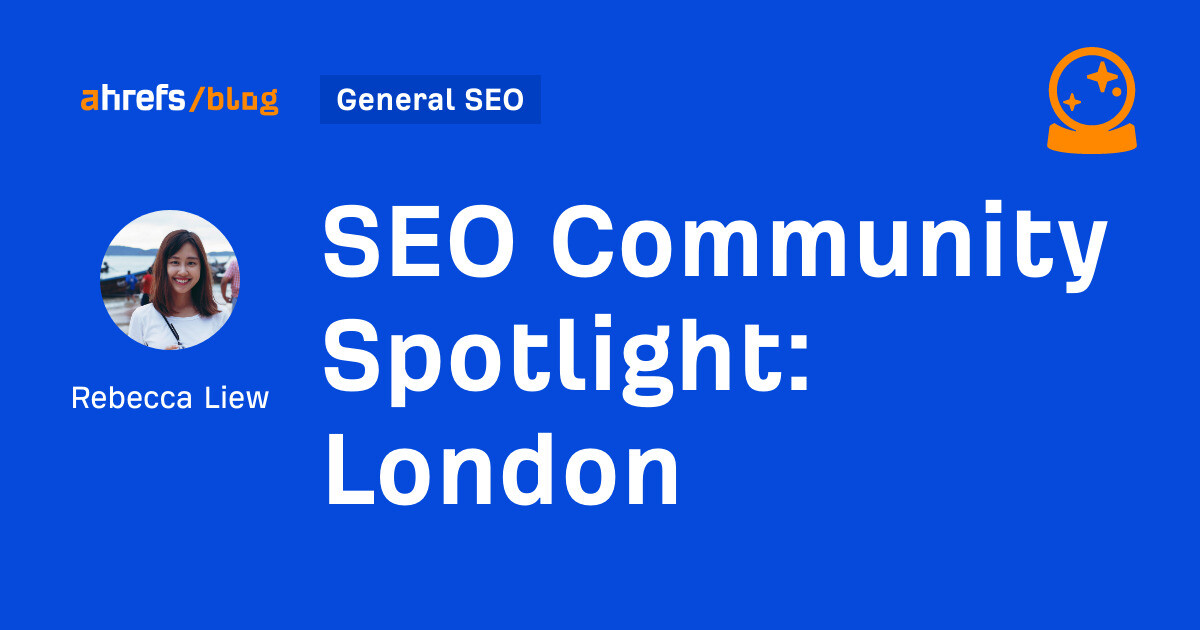
London’s SEO community is a vibrant, thriving one.
With so much ground to cover, we did some serious digging to showcase the city’s best SEO speakers, conferences, and meet-ups.
London’s search community was nascent but sizable from the early noughties. By around 2010, small SEO meet-ups were happening with fair regularity across the city.
As the search space flourished, some meet-ups gained enough traction to organize namesake conferences, including LondonSEO XL and SMX London.
There’s a meet-up for every kind of SEO professional. Here are some notable ones:
Search London
Search London has been around for over a decade.
For context, co-organizer Jo took over Search London in October 2010. Back then, the meet-up was known as “SEO, SMO and PPC” and was run by Judith Lewis—who today owns advertising agency Decabbit Consultancy.
The meet-up is open to anyone in SEO, PPC, or social media—and offers marketing professionals and first-time speakers a safe, supportive space to share their industry knowledge and experiences.
The group has ramped up its online and offline meet-ups in the past year—these typically take place once a month.
Search London speakers also occasionally broach broader and more diverse topics, such as how to be an LGBTQ+ ally in marketing, or handling workplace stress.
Search ‘n Stuff
After moving to London and attending several SEO meet-ups and conferences around the city, Yagmur founded Search ‘n Stuff in June this year. She even held a poll to gauge potential interest:
If I organised exclusive event; search industry oriented / formatted “mezze” nights at a contemporary “ocakbasi”every other month in London, would you be willing to pay and attend any of them?
* Starting from June 23
* Including max 12-15 attendees— Yagmur Simsek (@yagmrsmsk) April 29, 2023
Unlike your typical SEO meet-up, each (paid) session takes place in a fireside restaurant with around 12 marketers. Expect sharings centered on strategies, campaigns, and other relevant topics.
✨We didn’t let the water pipe problem stop us 😆 – we switched gears from the Turkish restaurant idea to a spontaneous cocktail bar with live music and tasty tapas. 🎊 Thanks to the fantastic enthusiasm from all at the gathering, we pulled off an amazing evening! pic.twitter.com/njm6niQPWE
— Yagmur Simsek (@yagmrsmsk) August 23, 2023
Fledgling as Search ‘n Stuff may be, the group’s already held gatherings in Brighton and Istanbul. And Yagmur has bigger plans—including organizing a namesake conference that will bring together a diverse range of voices and insights.
Online Marketing London
What started as a personal project for founder Gus in 2010 has since evolved drastically: Today, Online Marketing London brings together the city’s top SEOs and marketers through quarterly networking events and workshops.
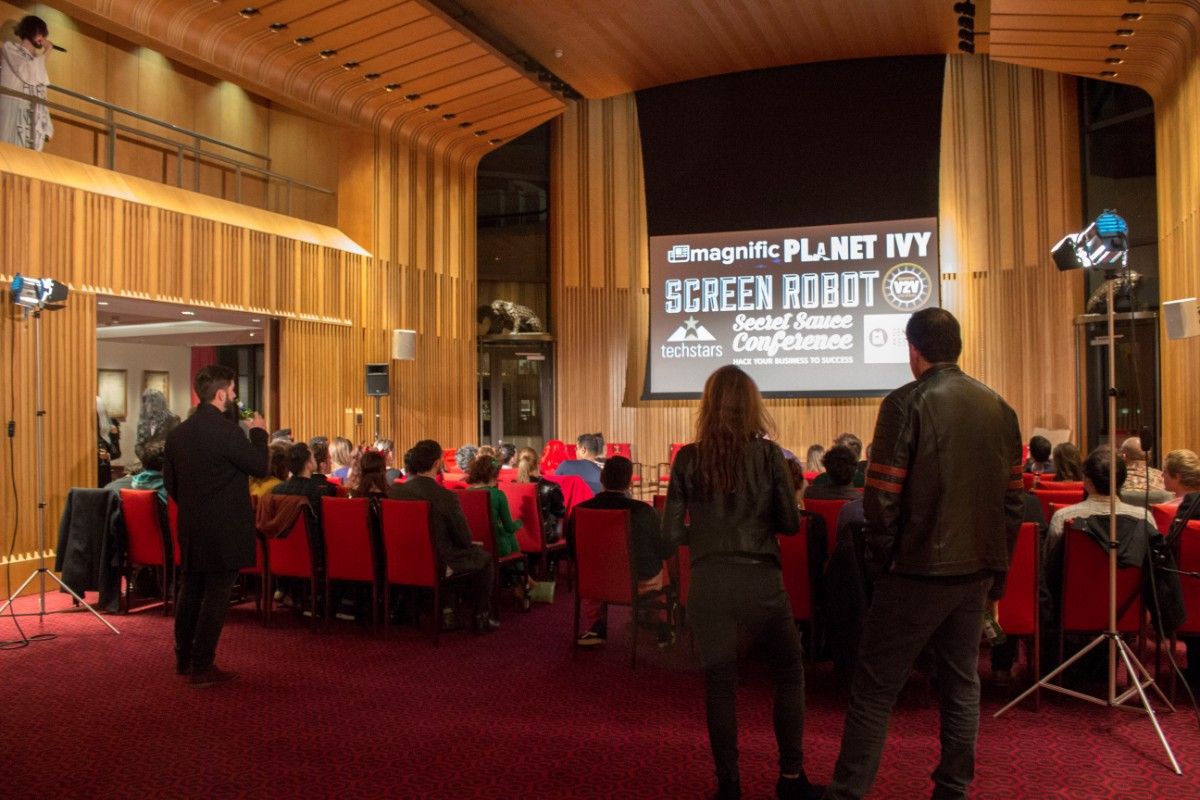

Topics of discussion revolve around the evolution of marketing, the future of work, and more. You can also join their Slack channel, Tech London—though it isn’t SEO-focused.
In 2024, Gus and Michael plan to organize more regular events for their members.
London SEO Meet-up
If you’ve heard of LondonSEO XL, you may know that the annual conference is an extension of this meet-up by SEO agency Blue Array.
Since 2018, its mission has been to elevate the industry by promoting strong SEO practices and speakers.
Before moving into a more casual networking session, its bimonthly meet-ups typically kick off with sharings from experts—past speakers include Nick Wilsdon, Paige Hobart, and Search London’s Jo.
PPC Live
PPC Live is relatively new to the SEO scene: After noticing there weren’t any PPC networking events around the city, Anu founded the (ticketed) meet-up in April 2022.
We’re so so so so so full of joy after yesterday’s event. Look at the turnout and our awesome speakers. It was a record turnout – again!! Ooh…@ppcliveuk community are the best!! 🥰🥰🥳
That wraps up our events of 2023 – see you Feb 1st, 2024!!🙌🏾✌🏾#PPCChat #MarketingTwitter pic.twitter.com/W5kdyCJrMv
— PPC Live UK (@ppcliveuk) October 27, 2023
Events take place once a quarter, with the next one slated for Jan 2024. Each session is a casual get-together over drinks and food as four speakers share their expertise. Expect a solid lineup—past speakers include Rand Fishkin, Crystal Carter, Holly Kelly, and more.
Search conferences across the UK are aplenty—but you’ll find some solid options within London, too
(Not from around here? We rounded up the best SEO conferences from elsewhere.)
WTSFest London
Women in Tech SEO (WTS) began in 2019 as a support network for women in the technical SEO space and has grown to 6,000 members across Facebook and Slack.
Founder Areej AbuAli has since organized three editions of WTSFest—an annual full-day conference whose speakers come from all areas of search. WTS also runs workshops, a mentorship program, and even a podcast and newsletter.
LondonSEO XL Conference
LondonSEO runs meet-ups, as we mentioned earlier—but their conferences are really a culmination of the Blue Array team’s hard work. (Ahrefs was even a headline sponsor for LondonSEO XL in 2022 and 2023!)
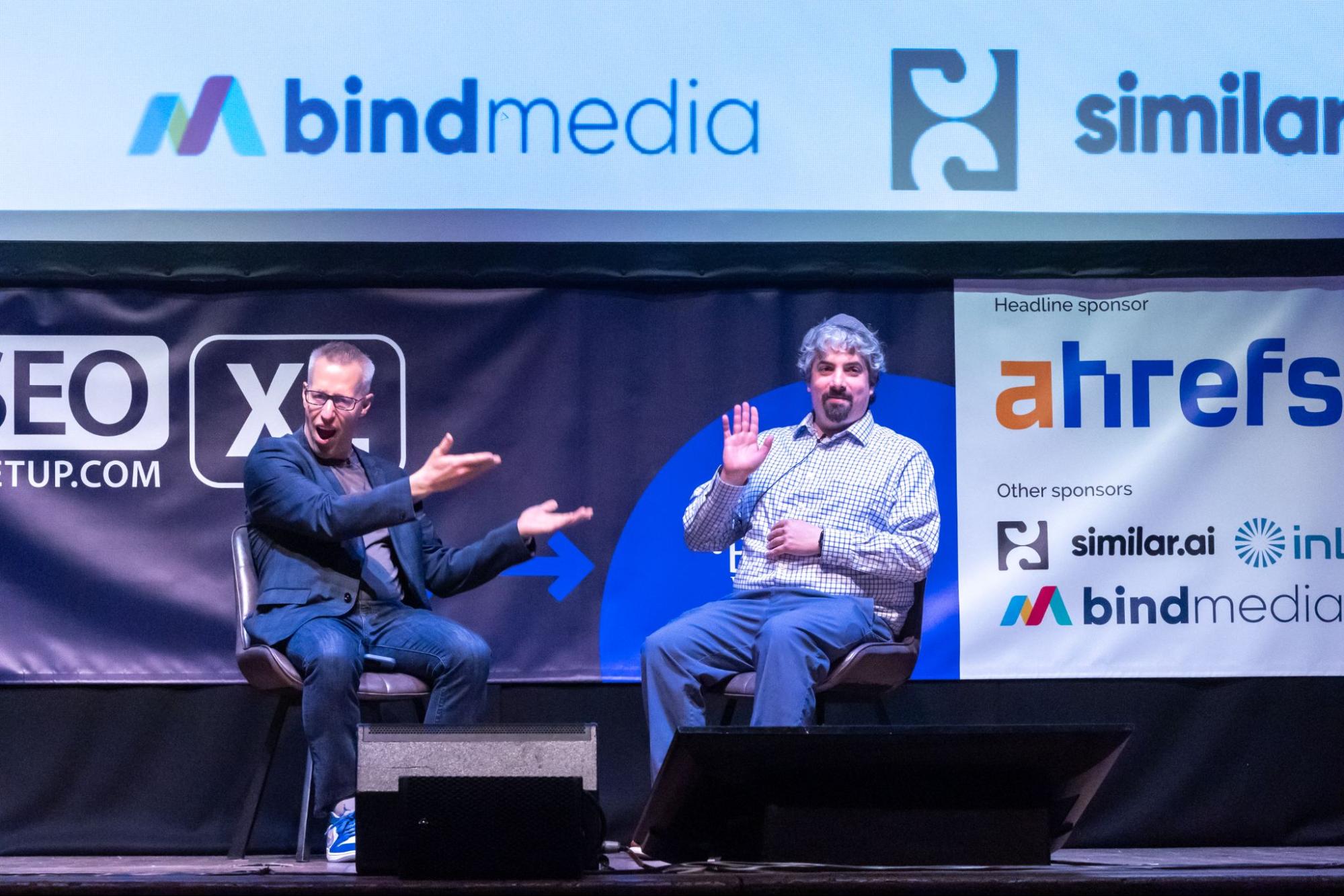

For a taste of what to expect, you can access speaker slides and replay videos from this year’s conference here. Speakers included Barry Schwartz, Chima Mmeje, Ahrefs’ own Joshua Hardwick, and many more.
MeasureCamp London
Conceived in 2012 by Peter O’Neill, MeasureCamp is a (free!) digital analytics conference that now takes place in 24 cities around the world.
https://www.youtube.com/watch?v=W4nl8LDH3kI
The idea behind the conference was born of casual meet-ups among a group of developers, product managers, and social media users. Peter leveraged the growing network and organized the first MeasureCamp conference in Mozilla’s London office in Sep 2012.
At MeasureCamp London 2023, experts from the likes of Meta, Conductrics, and Measurelab discussed everything from full-funnel growth to measuring email performance.
SearchLove Conference
SearchLove is a marketing conference conceived in 2009 by Distilled founders Will Critchlow and Duncan Morris. The conference today takes place in London, San Diego, and Philadelphia.
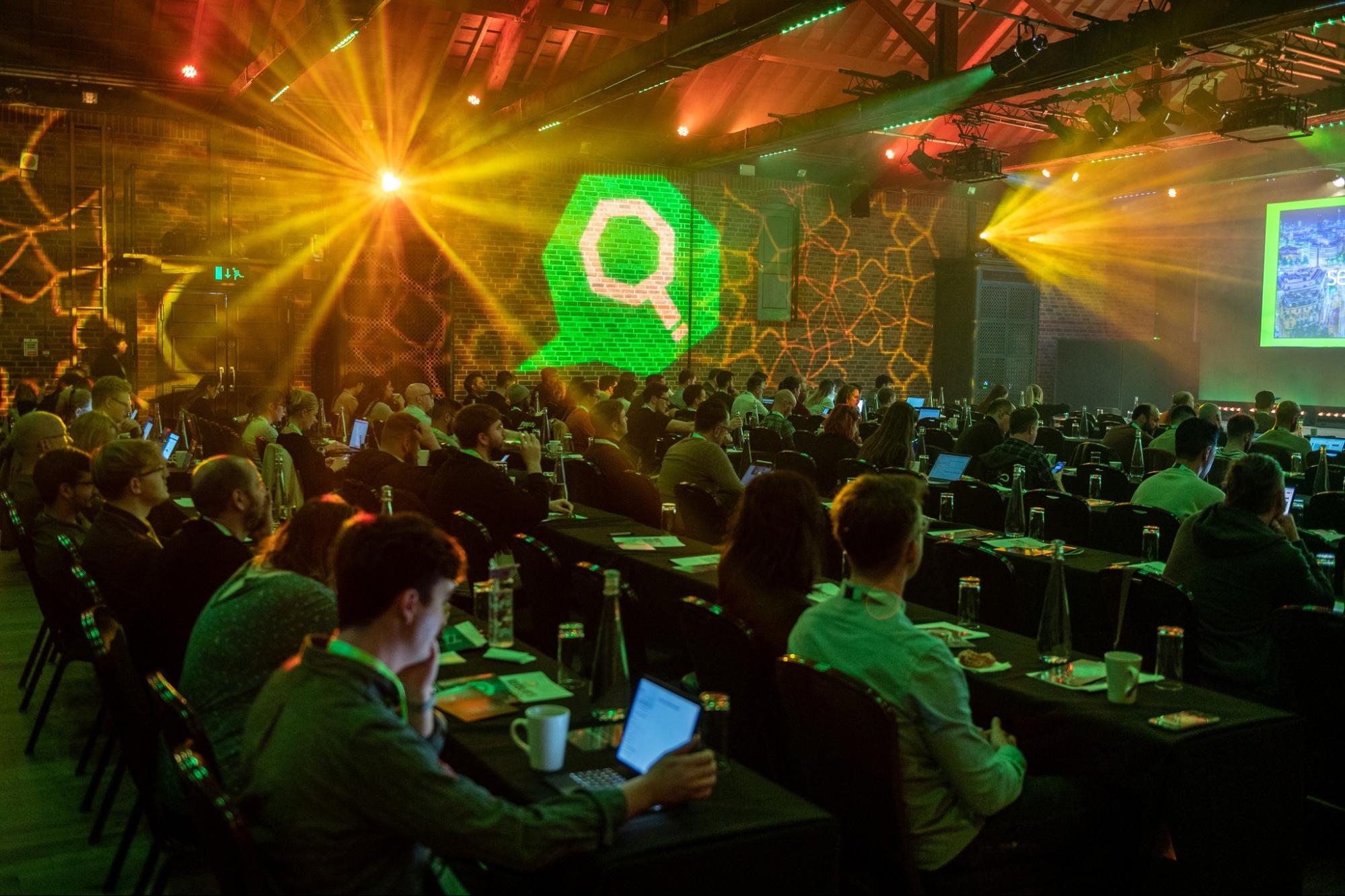

In its most recent San Diego edition, the two-day conference saw 200+ marketers in attendance to glean insights from the likes of Dr. Pete Meyers, Aleyda Solis, and Will Reynolds.
Search Marketing Expo (SMX) London
This well-loved conference series by Search Engine Land has been around for 15 years (!), and brings together some of the best-in-class marketers.
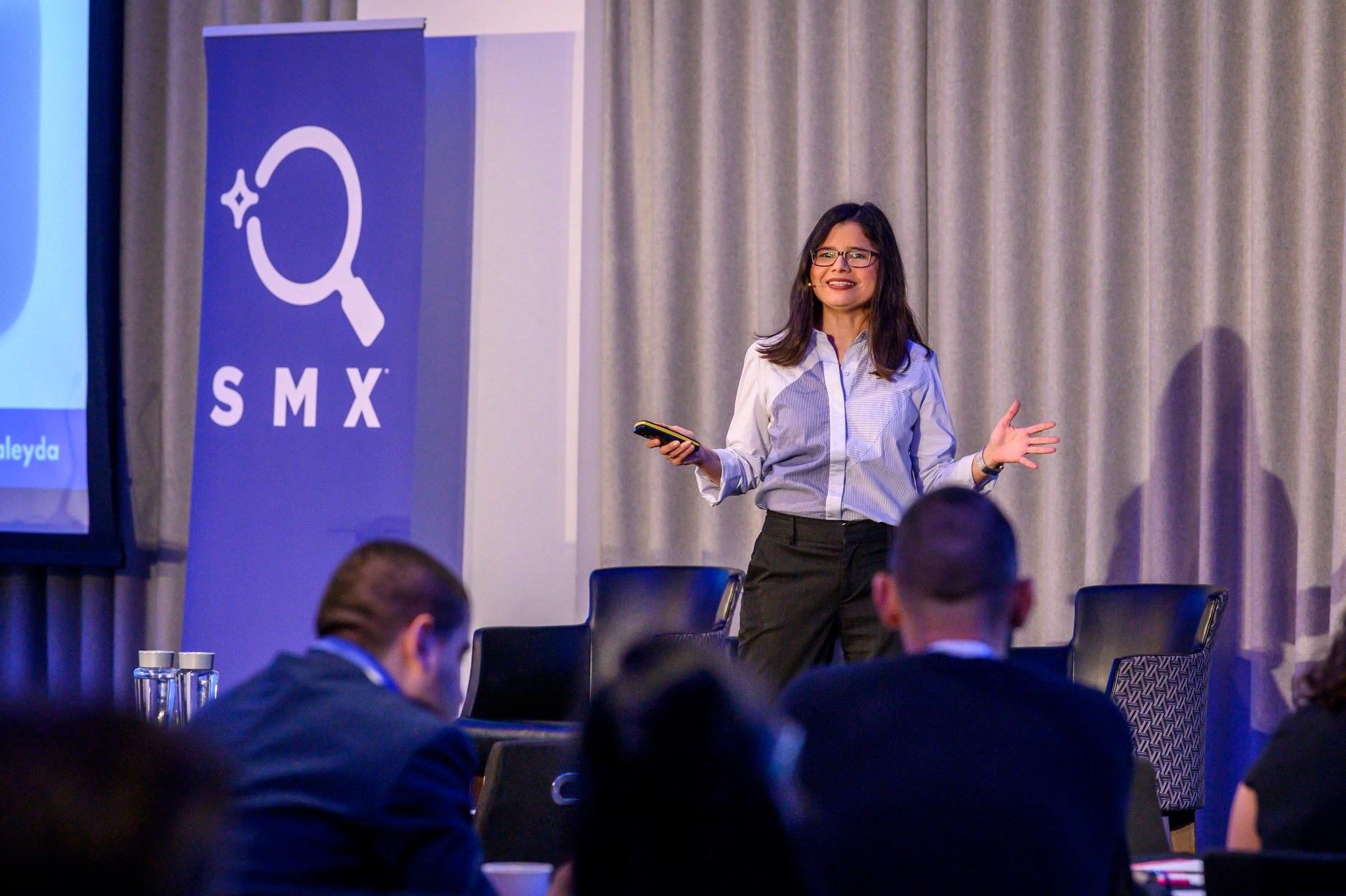

Despite its name, the conference is open to everyone: developers, PR reps, and social media marketers. Each edition has multiple tracks no matter your level of experience, so you’re bound to leave with fresh takeaways and an expanded network of contacts.
You’ll find a slew of talented search professionals residing in the city—and attending meet-ups and conferences too. These include:
Areej AbuAli, Crawlina
Areej is best known for founding Women in Tech SEO. This community champions diversity and inclusion for underrepresented voices in the tech industry. She’s also the founder of SEO consultancy Crawlina, whose services span technical and on-site SEO.
Will Critchlow, SearchPilot
Will is the founder and CEO of SearchPilot, a server-side A/B testing platform. He previously co-founded Distilled alongside Duncan Morris. The pair are also the brains behind SearchLove Conference.
Chima Mmeje, Moz
Chima is a senior content marketer at Moz and a contributor to Zenith Copy, Search Engine Watch, and more. Before this, she worked on content strategy projects for the likes of Aura, Pace, and First Page Strategy.
Judith Lewis, Decabbit Consultancy
Judith has over 25 years of digital marketing experience, with a focus on SEO. She founded and currently helms advertising firm Decabbit Consultancy.
Anu Adegbola, PPC Live
Anu is the CMO and founder of PPC Live, a London-based meet-up. She’s served in various paid search roles and was previously global CMO at Brainlabs. She also hosts and produces a podcast called #PPCChat Roundup—give it a listen here.
Gus Ferguson, Ascendant
Gus is the co-founder of venture consultancy Ascendant, where he looks after its growth marketing efforts. He is also a co-organizer for marketing meet-up Online Marketing London. Prior to this, he served as partner at growth agency Salience.
Yagmur Simsek, Philip Morris International
When she’s not organizing meet-ups for Search ‘n Stuff, Yagmur is an in-house SEO at Philip Morris International. She’s also the co-founder of cybersecurity firm CGS Network, and previously worked in SEO strategy roles at digital agencies including Re:signal and Optdcom.
London is home to a high concentration of search-focused agencies—among them Blue Array, The SEO Works, GenieCrawl, SEO Works, Crawlina, Brainlabs, and Make Agency.
Then there’s Screaming Frog, which you may know (and use!) thanks to its site crawler and log file analyzer tools. They also have an offshoot agency that offers SEO services and beyond.
Another popular (if slightly more niche) company is SearchPilot by Will Critchlow, whom we mentioned a little earlier. His company’s SEO A/B testing platform is built for businesses across retail, travel, ecommerce, and more.
Final thoughts
With the wealth of search events and meet-ups around London, it’s never been easier to expand your network or get involved—many groups are on the constant lookout for first-time speakers, organizers, event spaces, and sponsors.
Want to be included? Drop me a message on Twitter (X).
SEO
Google Cautions On Blocking GoogleOther Bot

Google’s Gary Illyes answered a question about the non-search features that the GoogleOther crawler supports, then added a caution about the consequences of blocking GoogleOther.
What Is GoogleOther?
GoogleOther is a generic crawler created by Google for the various purposes that fall outside of those of bots that specialize for Search, Ads, Video, Images, News, Desktop and Mobile. It can be used by internal teams at Google for research and development in relation to various products.
The official description of GoogleOther is:
“GoogleOther is the generic crawler that may be used by various product teams for fetching publicly accessible content from sites. For example, it may be used for one-off crawls for internal research and development.”
Something that may be surprising is that there are actually three kinds of GoogleOther crawlers.
Three Kinds Of GoogleOther Crawlers
- GoogleOther
Generic crawler for public URLs - GoogleOther-Image
Optimized to crawl public image URLs - GoogleOther-Video
Optimized to crawl public video URLs
All three GoogleOther crawlers can be used for research and development purposes. That’s just one purpose that Google publicly acknowledges that all three versions of GoogleOther could be used for.
What Non-Search Features Does GoogleOther Support?
Google doesn’t say what specific non-search features GoogleOther supports, probably because it doesn’t really “support” a specific feature. It exists for research and development crawling which could be in support of a new product or an improvement in a current product, it’s a highly open and generic purpose.
This is the question asked that Gary narrated:
“What non-search features does GoogleOther crawling support?”
Gary Illyes answered:
“This is a very topical question, and I think it is a very good question. Besides what’s in the public I don’t have more to share.
GoogleOther is the generic crawler that may be used by various product teams for fetching publicly accessible content from sites. For example, it may be used for one-off crawls for internal research and development.
Historically Googlebot was used for this, but that kind of makes things murky and less transparent, so we launched GoogleOther so you have better controls over what your site is crawled for.
That said GoogleOther is not tied to a single product, so opting out of GoogleOther crawling might affect a wide range of things across the Google universe; alas, not Search, search is only Googlebot.”
It Might Affect A Wide Range Of Things
Gary is clear that blocking GoogleOther wouldn’t have an affect on Google Search because Googlebot is the crawler used for indexing content. So if blocking any of the three versions of GoogleOther is something a site owner wants to do, then it should be okay to do that without a negative effect on search rankings.
But Gary also cautioned about the outcome that blocking GoogleOther, saying that it would have an effect on other products and services across Google. He didn’t state which other products it could affect nor did he elaborate on the pros or cons of blocking GoogleOther.
Pros And Cons Of Blocking GoogleOther
Whether or not to block GoogleOther doesn’t necessarily have a straightforward answer. There are several considerations to whether doing that makes sense.
Pros
Inclusion in research for a future Google product that’s related to search (maps, shopping, images, a new feature in search) could be useful. It might be helpful to have a site included in that kind of research because it might be used for testing something good for a site and be one of the few sites chosen to test a feature that could increase earnings for a site.
Another consideration is that blocking GoogleOther to save on server resources is not necessarily a valid reason because GoogleOther doesn’t seem to crawl so often that it makes a noticeable impact.
If blocking Google from using site content for AI is a concern then blocking GoogleOther will have no impact on that at all. GoogleOther has nothing to do with crawling for Google Gemini apps or Vertex AI, including any future products that will be used for training associated language models. The bot for that specific use case is Google-Extended.
Cons
On the other hand it might not be helpful to allow GoogleOther if it’s being used to test something related to fighting spam and there’s something the site has to hide.
It’s possible that a site owner might not want to participate if GoogleOther comes crawling for market research or for training machine learning models (for internal purposes) that are unrelated to public-facing products like Gemini and Vertex.
Allowing GoogleOther to crawl a site for unknown purposes is like giving Google a blank check to use your site data in any way they see fit outside of training public-facing LLMs or purposes related to named bots like GoogleBot.
Takeaway
Should you block GoogleOther? It’s a coin toss. There are possible potential benefits but in general there isn’t enough information to make an informed decision.
Listen to the Google SEO Office Hours podcast at the 1:30 minute mark:
Featured Image by Shutterstock/Cast Of Thousands
SEO
AI Search Boosts User Satisfaction

A new study finds that despite concerns about AI in online services, users are more satisfied with search engines and social media platforms than before.
The American Customer Satisfaction Index (ACSI) conducted its annual survey of search and social media users, finding that satisfaction has either held steady or improved.
This comes at a time when major tech companies are heavily investing in AI to enhance their services.
Search Engine Satisfaction Holds Strong
Google, Bing, and other search engines have rapidly integrated AI features into their platforms over the past year. While critics have raised concerns about potential negative impacts, the ACSI study suggests users are responding positively.
Google maintains its position as the most satisfying search engine with an ACSI score of 81, up 1% from last year. Users particularly appreciate its AI-powered features.
Interestingly, Bing and Yahoo! have seen notable improvements in user satisfaction, notching 3% gains to reach scores of 77 and 76, respectively. These are their highest ACSI scores in over a decade, likely due to their AI enhancements launched in 2023.
The study hints at the potential of new AI-enabled search functionality to drive further improvements in the customer experience. Bing has seen its market share improve by small but notable margins, rising from 6.35% in the first quarter of 2023 to 7.87% in Q1 2024.
Customer Experience Improvements
The ACSI study shows improvements across nearly all benchmarks of the customer experience for search engines. Notable areas of improvement include:
- Ease of navigation
- Ease of using the site on different devices
- Loading speed performance and reliability
- Variety of services and information
- Freshness of content
These improvements suggest that AI enhancements positively impact various aspects of the search experience.
Social Media Sees Modest Gains
For the third year in a row, user satisfaction with social media platforms is on the rise, increasing 1% to an ACSI score of 74.
TikTok has emerged as the new industry leader among major sites, edging past YouTube with a score of 78. This underscores the platform’s effective use of AI-driven content recommendations.
Meta’s Facebook and Instagram have also seen significant improvements in user satisfaction, showing 3-point gains. While Facebook remains near the bottom of the industry at 69, Instagram’s score of 76 puts it within striking distance of the leaders.
Challenges Remain
Despite improvements, the study highlights ongoing privacy and advertising challenges for search engines and social media platforms. Privacy ratings for search engines remain relatively low but steady at 79, while social media platforms score even lower at 73.
Advertising experiences emerge as a key differentiator between higher- and lower-satisfaction brands, particularly in social media. New ACSI benchmarks reveal user concerns about advertising content’s trustworthiness and personal relevance.
Why This Matters For SEO Professionals
This study provides an independent perspective on how users are responding to the AI push in online services. For SEO professionals, these findings suggest that:
- AI-enhanced search features resonate with users, potentially changing search behavior and expectations.
- The improving satisfaction with alternative search engines like Bing may lead to a more diverse search landscape.
- The continued importance of factors like content freshness and site performance in user satisfaction aligns with long-standing SEO best practices.
As AI becomes more integrated into our online experiences, SEO strategies may need to adapt to changing user preferences.
Featured Image: kate3155/Shutterstock
SEO
Google To Upgrade All Retailers To New Merchant Center By September
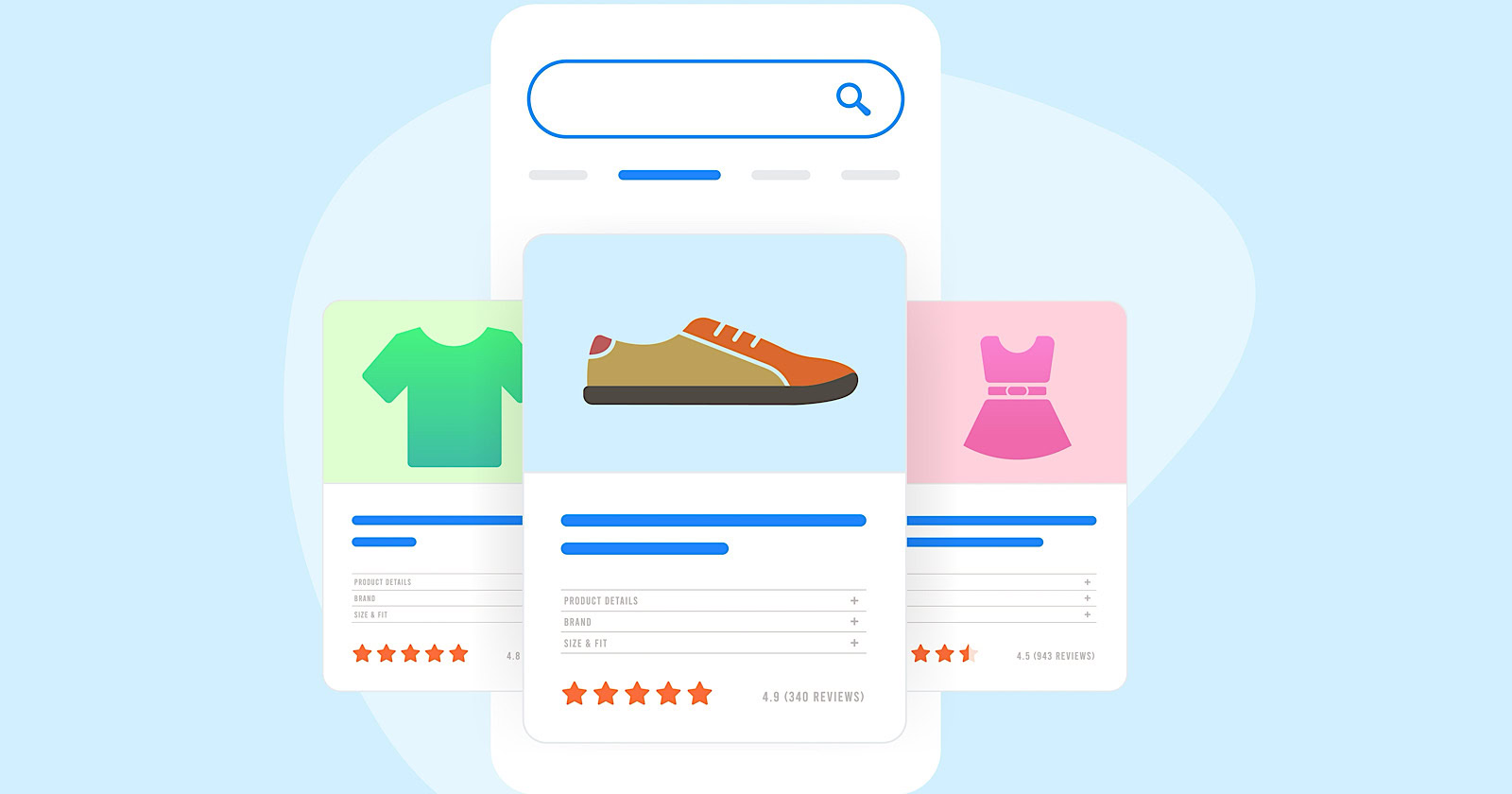
Google has announced plans to transition all retailers to its updated Merchant Center platform by September.
This move will affect e-commerce businesses globally and comes ahead of the holiday shopping season.
The Merchant Center is a tool for online retailers to manage how their products appear across Google’s shopping services.
Key Changes & Features
The new Merchant Center includes several significant updates.
Product Studio
An AI-powered tool for content creation. Google reports that 80% of current users view it as improving efficiency.
This feature allows retailers to generate tailored product assets, animate still images, and modify existing product images to match brand aesthetics.
It also simplifies tasks like background removal and image resolution enhancement.
Centralized Analytics
A new tab consolidating various business insights, including pricing data and competitive analysis tools.
Retailers can access pricing recommendations, competitive visibility reports, and retail-specific search trends, enabling them to make data-driven decisions and capitalize on popular product categories.
Redesigned Navigation
Google claims the new interface is more intuitive and cites increased setup success rates for new merchants.
The platform now offers simplified website verification processes and can pre-populate product information during setup.
Initial User Response
According to Google, early adopters have shown increased engagement with the platform.
The company reports a 25% increase in omnichannel merchants adding product offers in the new system. However, these figures have yet to be independently verified.
Jeff Harrell, Google’s Senior Director of Merchant Shopping, states in an announcement:
“We’ve seen a significant increase in retention and engagement among existing online merchants who have moved to the new Merchant Center.”
Potential Challenges and Support
While Google emphasizes the upgrade’s benefits, some retailers, particularly those comfortable with the current version, may face challenges adapting to the new system.
The upgrade’s mandatory nature could raise concerns among users who prefer the existing interface or have integrated workflows based on the current system.
To address these concerns, Google has stated that it will provide resources and support to help with the transition. This includes tutorial videos, detailed documentation, and access to customer support teams for troubleshooting.
Industry Context
This update comes as e-commerce platforms evolve, with major players like Amazon and Shopify enhancing their seller tools. Google’s move is part of broader efforts to maintain competitiveness in the e-commerce services sector.
The upgrade could impact consumers by improving product listings and providing more accurate information across Google’s shopping services.
For the e-commerce industry as a whole, it signals a continued push towards AI-driven tools and data-centric decision-making.
Transition Timeline
Google states that retailers will be automatically upgraded by September if they still need to transition.
The company advises users to familiarize themselves with the new features before the busy holiday shopping period.
Featured Image: BestForBest/Shutterstock
-

 SEARCHENGINES5 days ago
SEARCHENGINES5 days agoBillions Of Google goo.gl URLs To 404 In The Future
-
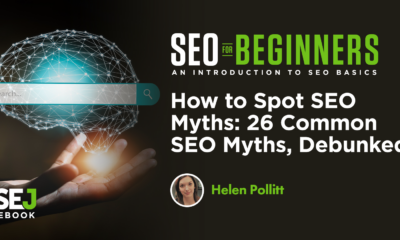
 SEO7 days ago
SEO7 days ago26 Common SEO Myths, Debunked
-
SEARCHENGINES4 days ago
Daily Search Forum Recap: July 22, 2024
-

 SEARCHENGINES6 days ago
SEARCHENGINES6 days agoGoogle Core Update Coming, Ranking Volatility, Bye Search Notes, AI Overviews, Ads & More
-

 SEO5 days ago
SEO5 days ago11 Copyscape Alternatives To Check Plagiarism
-

 SEO6 days ago
SEO6 days agoGoogle Warns Of Last Chance To Export Notes Search Data
-
SEARCHENGINES3 days ago
Daily Search Forum Recap: July 23, 2024
-

 AFFILIATE MARKETING6 days ago
AFFILIATE MARKETING6 days agoThe Top 5 AI Tools That Can Revolutionize Your Workflow and Boost Productivity















